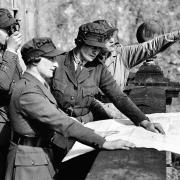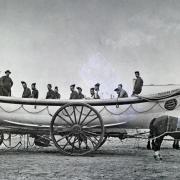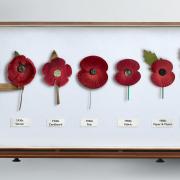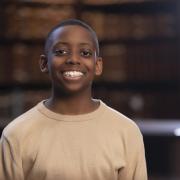‘I was 16 when I first called Childline. It was the night I was told I was going to be discharged from the psychiatric hospital that I’d been a patient in for the last six months. Feeling isolated and helpless, I tried to take my life.
‘Staff from the hospital intervened and left me in a side room with my phone. I remembered a poster I used to walk past in my school’s corridor with the number for Childline on it,and decided to give ‘asking for help’ one last shot.
‘Childline saved my life that night. I spoke to the counsellor for about 45 minutes about my life, including my friends, my dog, and the things I liked to do outside of hospital. The isolation and fear waned, and they calmed me down.

‘After that call, I ended up being diagnosed with a rare illness called Pervasive Arousal Withdrawal Syndrome and was hospitalised for a further year. I couldn’t walk unaided and stopped talking for nearly three years.
‘The only time I would speak during those years was when I would call Childline from the hospital, or from the shed at the bottom of my garden when I returned home. Over the course of two years, intermittent calls to Childline helped me gain the courage to start seeing a counsellor who I had met before I got ill. Shortly after that I started talking again and went back to school. It’s now seven years on and I’m about to graduate from university.
‘The very first night I called Childline they undoubtedly saved my life. And every call after that night helped me to start living again.’

Sadly, Hollie is not alone, almost 200,000 children and young people contacted Childline last year seeking support and a listening ear. The service delivered more than 105,000 counselling sessions to children around mental and emotional health and wellbeing issues. The NSPCC believes the only way we can keep all children safe and help them feel supported is if we come together.
That is why the NSPCC has created Childhood Day, which this year takes place on Friday June 7. Sponsored by Lidl GB, it is a day that brings people across the UK together to have fun and help protect and support children. You can take part in the Childhood Day Mile at school, work or with family and friends and move a mile, your way. Whether walking, cycling, swimming or even bouncing a mile, you will be raising funds for NSPCC services, such as Childline, and make a difference to children’s lives.
Childline counsellors are there 24/7 to listen and help with whatever children are facing. If you would like to support the NSPCC be there for more children, please search NSPCC and donate.
To sign up for a free fundraising pack, to donate or find out how to volunteer in collections, search NSPCC and Childhood Day.

Help is at hand
Rebecca Wilcox, who is training to become a counsellor for Childline, talks about her experience of being on the frontline of the service
Rebecca Wilcox took on the role of deputy president of Childline when her mum Esther Rantzen – the founder and president of the helpline – needed to step back to concentrate on her health. Childline has always been a part of Rebecca’s life, she was just a few years old when the service was founded in 1986.
‘Childline volunteers are there to listen and provide support to children to talk about anything they want or need to, from issues such as sex, drugs or relationships, through to topics such as self-harm, suicide and abuse. My first call as a trained volunteer was supporting a young person who was experiencing one of the latter topics. From this call I could clearly see the mental health crisis that our young people and children are suffering across the UK.
‘However, it is encouraging to see the resilience in young people and the sheer bravery of building up the courage to talk to Childline. It’s truly wonderful that once that child has made the decision to call or contact the service online, you can see the progress they make towards a decision that they’re happy with – whether that’s across one call or several.

‘We all lead such busy lives now, which come with so many stresses, and it can be difficult to find the time to be there for other people as our amazing volunteers do – but this is exactly what Childline is there for, to support children.
‘All of the volunteers go through an extensive training programme that is exceptional. It teaches us to actively listen, paraphrase and summarise what is being said to us, so that the child really knows we’re listening to them. It’s a truly inspiring service to be part of, and to sit alongside so many outstanding and caring volunteers is a privilege.
‘Childline was always a star for my mum, so for me to work on this and talk to her about it is such a privilege and I’m so grateful to be involved.’
Children and young people can contact Childline at any time on 0800 1111 or via childline.org.uk
Adults with concerns about a child can speak to the NSPCC helpline on 0808 800 5000, email help@nspcc.org.uk or find advice and guidance at nspcc.org.uk


























